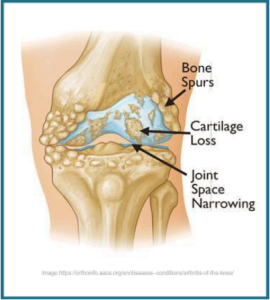What is Arthritis?
Tips
Staying active, maintaining a healthy weight, and receiving physical therapy treatment early on may help slow progression as well as help to improve pain and function.
Imaging
X-ray imaging is the easiest way to evaluate a joint for arthritis. Imaging is not always necessary prior to physical therapy. Your PT can help determine if/when imaging is needed.
Common Symptoms
● Joint pain
● Joint swelling
● Joint stiffness
● Decreased range of motion
Osteoarthritis
1. This type of arthritis is the most commonly dealt with in physical therapy.
2. Osteoarthritis is a form of arthritis that is a wear and tear type of degeneration. It is the most common type of arthritis in the knee but can also be present in other joints such as the hips, shoulder, spine, etc.
3. With this, the protective cartilage coating on the bone gradually wears away leading to bone on bone contact in the most severe cases.
4. Pain generally worsens gradually over time rather than sudden onset, although this is still possible just less common.
5. Crunching, clicking, creaking sounds are common with an arthritic joint as this is usually caused by loose fragments of cartilage and other tissues.
6. Bone spur formation is common with this form of arthritis. As the cartilage breaks down, the body tries to repair the damage by forming more bone.
Physical Therapy
Strengthening, range of motion, and flexibility activities can help manage the pain and disability associated with arthritis.

